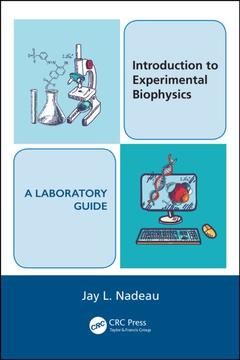Introduction to Experimental Biophysics - A Laboratory Guide
Auteur : Nadeau Jay L.

Easily Get Started with Biological Experiments
Introduction to Experimental Biophysics - A Laboratory Guide presents wet lab methods for courses in biophysics or molecular biology. A companion to the author?s highly praised An Introduction to Experimental Biophysics: Biological Methods for Physical Scientists, this manual offers a flexible course plan that permits completion of the labs in either a full term or intensive summer course.
Tested in a pedagogical setting, the experiments follow a logical progression beginning with a DNA construct. The book starts with the basics of molecular cloning: amplifying and purifying plasmid, plasmid mapping, and using restriction enzymes. Later experiments deal with more advanced, emerging techniques, such as the synthesis and characterization of quantum dots and gold nanoparticles, protein crystallization, and spectroscopic techniques.
This accessible guide will help both students and instructors in molecular biology, biophysics, and biomedical engineering. Students will understand how to use a variety of techniques in biological experiments while instructors will get practical guidance on preparing the experiments.
Molecular Cloning. Gene Expression. Fluorescent Reporter Genes in Mammalian Cells. Nanoparticles. Electrophysiology. Appendices. Index.
Jay L. Nadeau is an associate professor of biomedical engineering and physics at McGill University. Her research group was the first to label bacteria with quantum dots and explore the possibility of using fluorescent labels as tools for the detection of traces of extraterrestrial life. Dr. Nadeau’s research interests include nanoparticles, fluorescence imaging, and the development of instrumentation for detecting life elsewhere in the solar system.
Date de parution : 03-2015
13.8x21.6 cm
Date de parution : 06-2018
14.8x21 cm
Thèmes d’Introduction to Experimental Biophysics - A Laboratory Guide :
Mots-clés :
Bacterial Genomic DNA; Virtual Gels; Cloning; Experimental Biophysics; Biophysics; Fluorescence Plate Reader; Molecular Biology; Tae Buffer; Quantum dots; PCIA Extraction; Transfection; DNA Ladder; Cell culture; Gel Tray; Gold nanoparticles; PCR Prime Design; Protein purification; Plasmid DNA; Crystallography; Te Buffer; Spectroscopy; Annu Rev Microbiol; DNA ligation; Gel Loading Buffer; Plasmid; Microcentrifuge Tube; Cell line; Restriction Enzymes; Light microscopy; DNA Restriction; μL Ca; Solubilization Buffer; Cha Rac Ter; Coomassie Brilliant Blue Stain; Di-4 ANEPPS; Selenium Precursor; DNA Ligase; Poor Quality DNA; Vector NTI



